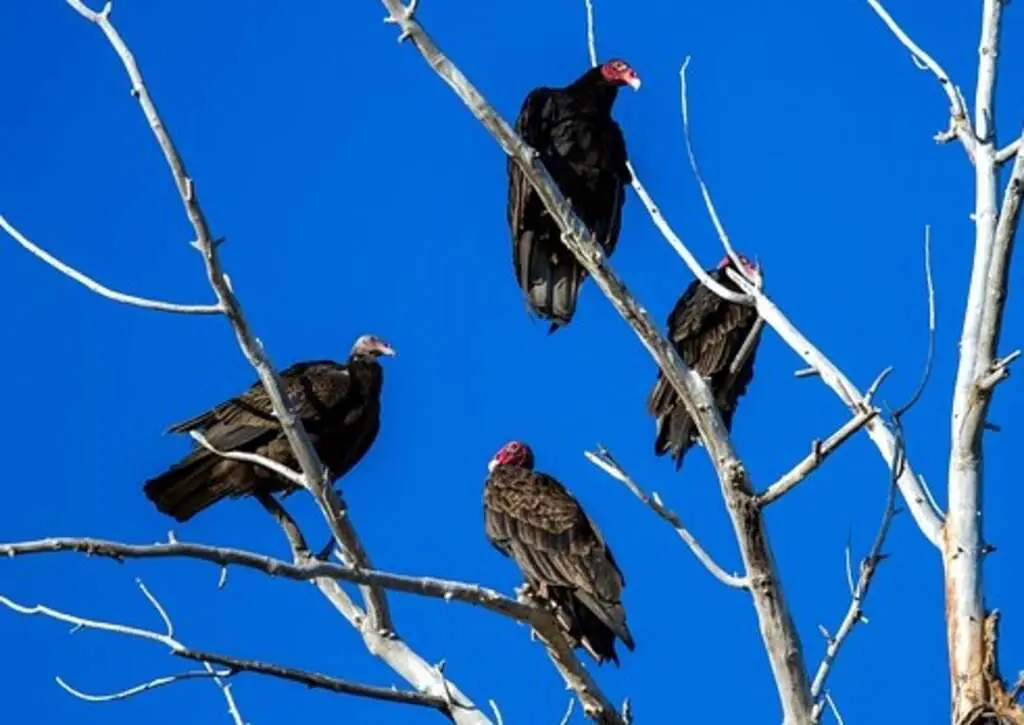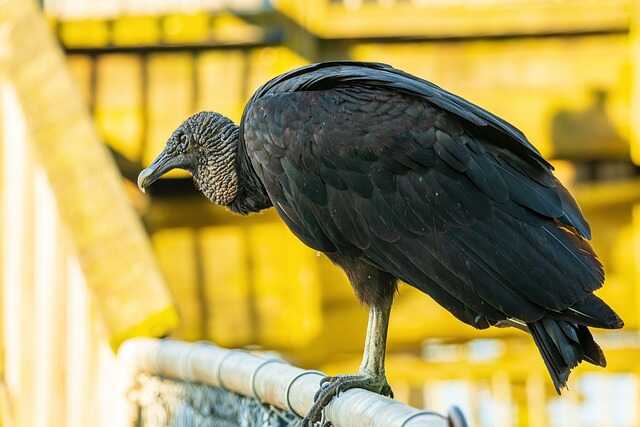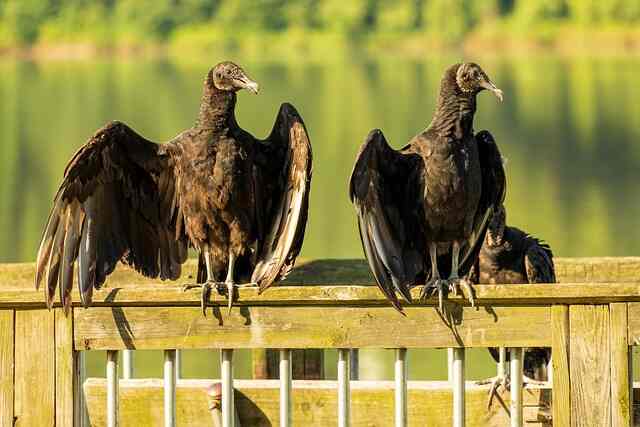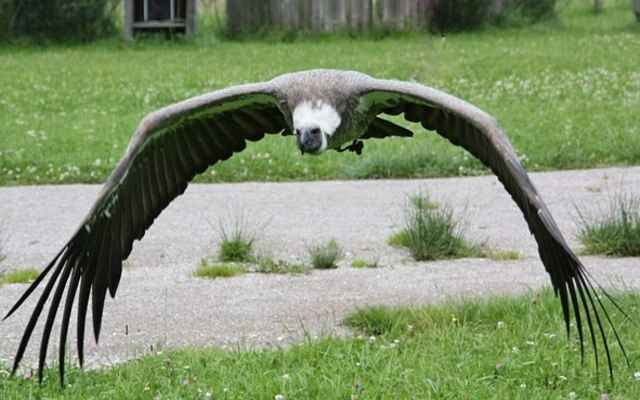Vultures are essential players in Florida’s ecosystem, serving as nature’s clean-up crew by efficiently disposing of dead animal carcasses. Their role is crucial in preventing the spread of disease and maintaining environmental balance.
However, despite their invaluable contribution, vultures have faced misconceptions and unfair vilification by humans. In this article, we’ll delve into the vital role these magnificent birds play in Florida’s ecosystem, while also examining their intriguing history within the state.
Table of Contents
- 0.1 A Brief History of Vultures in Florida
- 0.2 The Vultures of Florida
- 0.3 Florida Black Vulture: Traits, Behaviors, and Diet
- 0.4 Turkey Vultures in Florida
- 0.5 Vultures in Different Regions of Florida
- 0.6 Human-Vulture Conflicts in Florida
- 0.7 Protecting Vultures in Florida: Conservation Efforts and Best Practices
- 0.8 Conclusion
- 1 Frequently Asked Questions (FAQs)
- 1.0.1 What is the difference between a black vulture and a turkey vulture?
- 1.0.2 What do vultures in Florida eat?
- 1.0.3 Where do vultures live in Florida?
- 1.0.4 How big are Florida vultures?
- 1.0.5 What is the largest flying bird in Florida?
- 1.0.6 Why are there so many vultures in Miami?
- 1.0.7 Is it illegal to shoot a vulture in Florida?
- 1.0.8 What is the biggest threat to vultures?
- 1.0.9 Are vultures native to Florida?
- 1.0.10 What is the big black bird in Florida?
- 1.0.11 How can I prevent vultures from damaging my property in Florida?
- 1.0.12 Can I kill vultures in Florida if they are causing damage?
- 1.0.13 Are vultures protected in Florida?
- 1.0.14 Can vultures in Florida attack humans?
- 1.0.15 What should I do if I encounter a vulture in Florida?
- 1.0.16 Why are vultures hanging around my house?
- 1.0.17 What is the big black bird in Florida?
- 1.0.18 Why are there so many vultures in Miami?
- 1.0.19 What is the largest flying bird in Florida?
- 1.0.20 Are vultures native to Florida?
- 1.0.21 How big are Florida vultures?
- 1.1 Conclusion
- 1.2 Author
A Brief History of Vultures in Florida
Vultures have been present in Florida for thousands of years, and were once revered by Native American tribes for their ability to clean up the landscape. However, in recent times, vultures have faced numerous challenges, including habitat loss, hunting, and poisoning. Despite these challenges, vultures have adapted and continue to thrive in Florida.
In the following sections, we will delve deeper into the fascinating world of vultures in Florida, including the different species found in the state, their behavior and habitat, as well as some of the challenges they face.
We will also provide tips on how to coexist with these amazing birds, and answer some of the most frequently asked questions about vultures in Florida. So buckle up and get ready to learn all about these incredible scavengers!
The Vultures of Florida
When it comes to scavengers in Florida, vultures are a prominent and fascinating species. These birds play a crucial role in Florida’s ecosystem by cleaning up animal remains, which helps prevent the spread of disease. In this section, we’ll dive deeper into the world of vultures in Florida.
Meet the Vultures: Types and Traits of Vultures in Florida
There are two types of vultures that can be found in Florida: the black vulture and the turkey vulture.
The Black Vulture
Black vultures (Coragyps atratus) are one of the most common scavengers in Florida. They have a distinctive appearance with black feathers and a bare, grayish-black head. They are social birds that often gather in groups, and they are known for their aggressive behavior when competing for food.
Sure, here is a table for the black vulture:
| Species | Scientific Name | Average Wingspan | Average Weight | Habitat | Diet | Lifespan | Migratory | Conservation Status |
|---|---|---|---|---|---|---|---|---|
| Black Vulture | Coragyps atratus | 4.5-5.5 ft | 2.2-4.4 lbs | Forests, grasslands, urban areas | Carrion, garbage, sometimes live prey | Up to 20 years | Partially migratory, some populations migrate short distances | Least Concern |
Note: The information in the table is general and may vary depending on the specific population and location.
The Turkey Vulture
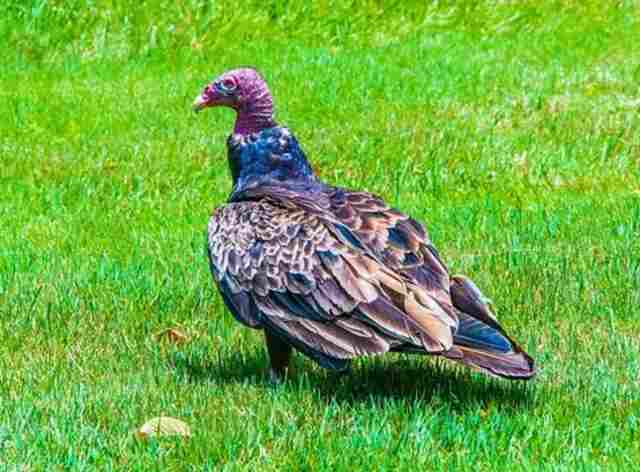
Turkey Vultures (Cathartes aura) are another common species in Florida. They are easily recognizable by their large size and red, featherless head. Unlike black vultures, turkey vultures are solitary birds that prefer to scavenge alone. They are also known for their impressive soaring abilities and can often be seen circling high in the sky.
| Species | Scientific Name | Average Wingspan | Average Weight | Habitat | Diet | Lifespan | Migratory | Conservation Status |
|---|---|---|---|---|---|---|---|---|
| Turkey Vulture | Cathartes aura | 6 feet | 2-4 lbs | Open country, forests, suburbs | Carrion (dead animals) | 6-10 years in the wild | Yes, migratory in Florida | Least Concern (IUCN) |
Note that conservation status can vary depending on the source and specific populations.
Why Are There So Many Vultures in Florida?
One of the reasons that vultures are so abundant in Florida is the warm climate. With plenty of sunshine and mild temperatures, Florida is an ideal environment for these birds. Additionally, the state’s extensive wetlands and coastline provide ample food sources for vultures.
Vultures in Florida Attacking Cars: Understanding the Behavior
One of the most intriguing behaviors of vultures in Florida is their tendency to attack cars. This behavior is believed to be caused by the reflection of sunlight on the vehicles, which vultures mistake for prey. While this can be a frustrating experience for drivers, it’s important to remember that vultures are protected by federal law, and harming them is illegal.
Black vultures are a common sight in Florida, known for their distinctive black feathers, sharp beaks, and bald heads. In this section, we’ll delve deeper into the world of black vultures, exploring their behaviors, habitat, and interactions with humans.
Florida Black Vulture: Traits, Behaviors, and Diet
Florida black vultures, or Coragyps atratus, are a medium-sized species of vulture that are native to the southeastern United States, including Florida. These birds are often seen in groups, soaring high above the treetops in search of carrion, which they locate using their keen sense of smell.
Black vultures are known for their distinctive black feathers, which help to absorb heat and keep their bodies warm. They also have bald, wrinkled heads that serve an important purpose: allowing them to feed on carrion without getting their feathers matted with blood.
In terms of diet, black vultures are true scavengers, feeding primarily on the carcasses of dead animals. They will eat almost any kind of carrion, from small rodents to large mammals, and have been known to feed on roadkill, deer carcasses, and even the remains of other birds.
Where to Find Black Vultures in Florida
Black vultures can be found throughout the state of Florida, from the panhandle to the keys. They are particularly common in areas with a high concentration of carrion, such as landfills, beaches, and highways. You may also spot them perched on the roofs of buildings or in trees, where they gather to roost at night.
Are Vultures Protected in Florida?
Laws and Regulations Yes, black vultures are protected under Florida state law, as well as federal law. It is illegal to harm or kill black vultures without a permit, and doing so can result in fines and even jail time. These laws exist to protect vultures and other birds of prey, which play an important role in maintaining a healthy ecosystem.
Human-Black Vulture Conflicts in Florida:
Prevention and Control While black vultures are an important part of Florida’s ecosystem, they can also cause conflicts with humans. In particular, these birds have been known to damage property by perching on roofs, cars, and other structures. They may also attack livestock and pets, especially if they are weakened or injured.
To prevent conflicts with black vultures, it’s important to take steps to discourage these birds from perching on your property. This might include using visual deterrents, such as scarecrows or reflective tape, or installing physical barriers, such as netting or spikes.
If you’re experiencing a serious problem with black vultures, you may need to consult with a wildlife control professional for assistance.
Turkey Vultures in Florida
Turkey vultures are one of the most iconic birds found in Florida, and they play an essential role in the ecosystem as scavengers. They are migratory birds and travel long distances to reach Florida.
In this section, we will discuss the migration of Turkey vultures, where to find them in Florida, how to prevent and control their presence, and how to handle conflicts between humans and turkey vultures.
The Migration of Turkey Vultures to Florida
Turkey vultures are migratory birds that can be found across North and South America. They typically migrate to warmer areas during the winter months, and Florida is a popular destination for many of them. In fact, Florida is home to one of the largest populations of wintering turkey vultures in the world.
During their migration, turkey vultures can travel long distances, sometimes up to 200 miles per day. They use thermal updrafts to gain altitude, and they can fly at high altitudes for long periods of time without flapping their wings. This makes them incredibly efficient and effective at covering large distances.
Where to Find Turkey Vultures in Florida
If you’re looking to spot some turkey vultures in Florida, there are several places you can go. One of the best places is the Everglades National Park, which is home to a large population of wintering vultures. Other popular locations include the Florida Keys, the Apalachicola National Forest, and the Merritt Island National Wildlife Refuge.
Turkey vultures are often seen perching on trees, telephone poles, or other high structures. They are also commonly seen soaring high in the sky, using their keen eyesight to spot their next meal.
Getting Rid of Turkey Vultures in Florida: Prevention and Control
Turkey vultures are generally harmless to humans, but they can cause damage to buildings and vehicles, and they can be a nuisance in large numbers. If you’re having a problem with turkey vultures on your property, there are several methods you can use to deter them.
One effective method is to install bird netting or spikes on buildings and other structures where vultures like to perch. You can also use visual deterrents, such as reflective tape or balloons, to scare them away. Another option is to use loud noises or water sprays to discourage them from roosting on your property.
It’s important to note that turkey vultures are protected under the Migratory Bird Treaty Act, so it is illegal to harm or kill them without a permit. If you’re having a problem with vultures and you’re not sure what to do, it’s best to contact a professional wildlife control company for help.
Human-Turkey Vulture Conflicts in Florida: Prevention and Control
While turkey vultures are generally harmless to humans, there have been instances where they have attacked people, especially if they feel threatened or cornered. It’s important to remember that these are wild animals, and they should be treated with caution and respect.
To avoid conflicts with turkey vultures, it’s best to keep your distance and avoid approaching them. If you encounter a vulture up close, try to stay calm and slowly back away. If a vulture is behaving aggressively or seems sick or injured, it’s important to contact a professional wildlife rehabilitator for assistance.
In summary, turkey vultures are an important part of Florida’s ecosystem, and they play a critical role in keeping our environment clean and healthy. While they may be a nuisance at times, there are ways to coexist with them peacefully and responsibly.
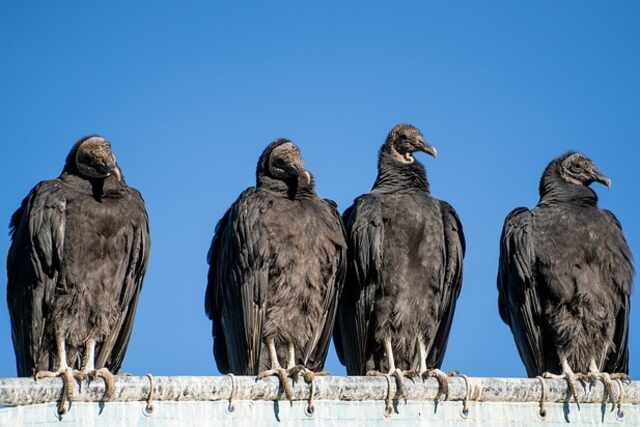
Vultures in Different Regions of Florida
Vultures in the Florida Panhandle: Behaviors and Habitat
The Florida Panhandle is home to both black and turkey vultures, and these scavengers play a vital role in the ecosystem by cleaning up animal carcasses. Black vultures in this region are often seen in large groups and have a more social behavior than their turkey vulture counterparts.
They have also been known to attack livestock, which can be a concern for farmers and ranchers in the area. Turkey vultures, on the other hand, are more solitary and can be seen soaring high in the sky. They rely heavily on thermals, or rising columns of warm air, to help them fly for long distances without flapping their wings.
Vultures in the Florida Keys: Adaptations and Diet
The Florida Keys are home to a large population of turkey vultures, and these birds have adapted to the unique environment of the islands. They have shorter wings and tails than their mainland counterparts, which helps them navigate through the tight spaces between buildings and trees.
Their diet mainly consists of fish and other marine life, which is abundant in the coastal waters surrounding the Keys. They can often be seen perched on top of buildings or trees, surveying the area for potential food sources.
Vultures in Florida Neighborhoods: Understanding the Risks
As Florida continues to grow, urbanization has caused vultures to move into residential areas in search of food. While these birds are generally harmless to humans, they can cause damage to property and pose a risk to pets. Vultures have been known to damage roofs and other structures, and their droppings can be unsightly and even corrosive.
Additionally, they may attack small pets or wildlife, which can be distressing for pet owners. It is important for homeowners to understand the risks associated with vultures and take appropriate measures to deter them from nesting in their neighborhoods.
Human-Vulture Conflicts in Florida
As much as vultures play an essential role in Florida’s ecosystem, they are known to create conflicts with humans. These conflicts can range from vultures attacking cars, neighborhoods, and even homes. In this section, we’ll explore some common human-vulture conflicts in Florida and ways to prevent and remediate them.
Is It Illegal to Kill Vultures in Florida? Legal and Ethical Considerations
It is against the law to kill or harm vultures, as they are protected by the Migratory Bird Treaty Act. The act was established to conserve migratory bird species that move between the United States and Canada, Mexico, Japan, and Russia. In Florida, black and turkey vultures are protected under this act, and killing them is punishable by hefty fines and possible imprisonment.
Apart from the legal ramifications, killing vultures is also considered unethical. Vultures play an essential role in Florida’s ecosystem as scavengers, and without them, dead animals and carcasses could accumulate, leading to health and environmental issues.
Vultures Destroyed My Home in Florida: Prevention and Remediation
Vultures can cause significant damage to homes and properties in Florida. They can rip off roof shingles, damage ventilation systems, and even create holes in walls. If you find yourself in this situation, it’s important to take immediate action to prevent further damage and potential health hazards.
One of the most effective ways to prevent vultures from damaging your home is to use visual deterrents. Vultures are known to avoid bright and reflective objects, so placing shiny materials on your roof or property can deter them. Covering the roof with netting or wire mesh can also prevent vultures from landing and causing damage.
If your property has already been damaged by vultures, it’s crucial to take remedial measures as soon as possible. Repair any damaged areas of the roof, replace missing shingles, and cover any holes or openings. It’s also important to sanitize the affected areas and dispose of any dead animals or carcasses that may have attracted the vultures.
| Prevention Techniques | Remediation Techniques | Additional Considerations |
|---|---|---|
| Installing netting or wire mesh over vulnerable areas | Repairing and reinforcing damaged areas to prevent future vulture damage | Vultures are protected under the Migratory Bird Treaty Act and it is illegal to harm or kill them without a permit |
| Closing off entry points, such as holes or gaps in roofs or walls | Cleaning and sanitizing areas where vultures have nested or roosted to prevent health hazards | Deterrents such as scarecrows, effigies, or reflective materials may be less effective for habituated vultures |
| Deterrents such as scarecrows, effigies, or reflective materials | Hiring a professional wildlife removal service to safely relocate vultures | Loud noises or flashing lights to scare away vultures may also disrupt neighboring residents or wildlife |
| Loud noises or flashing lights to scare away vultures | Working with local wildlife organizations to develop and implement vulture management plans | It’s important to address underlying attractants, such as food waste or compost, to discourage vulture activity |
Note: When dealing with vulture damage to property, it’s important to consult with a professional wildlife expert to ensure humane and effective solutions are implemented.
Vultures play an important role in the ecosystem of Florida by cleaning up and disposing of carrion. Despite their vital role, vultures face numerous challenges, including habitat loss, persecution by humans, and exposure to toxic substances. To ensure the survival of these important birds, conservation efforts are necessary.
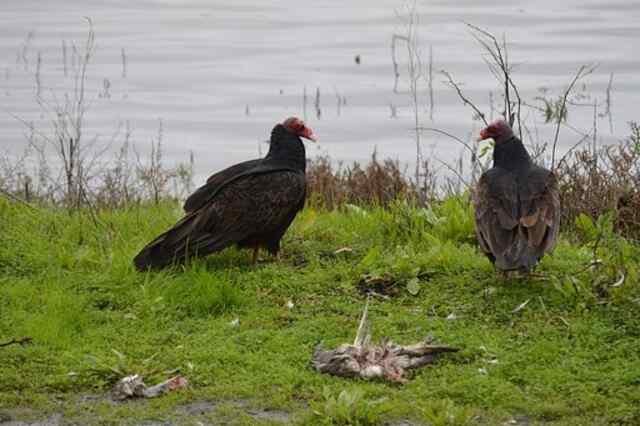
Protecting Vultures in Florida: Conservation Efforts and Best Practices
Several organizations in Florida are working to protect vultures and their habitat. The Florida Fish and Wildlife Conservation Commission (FWC) is responsible for managing vultures and other wildlife in the state. The FWC conducts surveys to monitor vulture populations and works with landowners to implement best practices for coexisting with vultures.
In addition to the FWC, several non-profit organizations are working to protect vultures in Florida. The Audubon Society and the Nature Conservancy both have programs focused on vulture conservation. These organizations work to protect vulture habitat, conduct research on vulture behavior, and educate the public about the importance of vultures.
To help protect vultures in Florida, there are several best practices that individuals can follow. These include:
- Avoid using pesticides that are toxic to vultures and other wildlife.
- Dispose of dead animals properly to reduce the risk of vultures becoming habituated to human-provided food sources.
- Avoid feeding vultures, as this can lead to habituation and aggressive behavior.
- If vultures are causing damage to property, use non-lethal methods to deter them, such as noise makers or visual deterrents.
Appreciating Vultures in Florida
Vultures are often misunderstood and underappreciated birds. Many people view them as dirty or ugly, and some even perceive them as a threat. However, vultures are an essential part of the ecosystem and play an important role in keeping our environment clean.
To promote appreciation for vultures in Florida, it is important to educate the public about their importance and dispel common myths and misconceptions. This can be done through public outreach and education programs, as well as by promoting positive media coverage of vultures.
In addition, individuals can take action to support vulture conservation efforts. This includes donating to organizations that are working to protect vultures and their habitat, participating in citizen science projects focused on vulture research, and advocating for policies that protect vultures and other wildlife.
Conclusion
Protecting vultures in Florida is essential for maintaining a healthy and balanced ecosystem. By supporting conservation efforts and promoting appreciation for these important birds, we can ensure their survival for generations to come.
Whether it is by following best practices for coexisting with vultures or taking action to support conservation efforts, we all have a role to play in protecting these valuable members of our natural world.
Frequently Asked Questions (FAQs)
What is the difference between a black vulture and a turkey vulture?
The black vulture and the turkey vulture can be distinguished by their physical characteristics and behavior. The black vulture has a shorter wingspan, shorter tail, and a gray head, while the turkey vulture has a longer wingspan, longer tail, and a red head. Black vultures are social scavengers that feed in groups, while turkey vultures are soaring specialists that primarily feed alone.
What do vultures in Florida eat?
Vultures in Florida are scavengers that feed on carrion, including dead animals, fish, and reptiles. They play an important role in cleaning up the environment by consuming animal carcasses that could otherwise harbor disease and attract other scavengers.
Where do vultures live in Florida?
Vultures in Florida can be found in a variety of habitats, including forests, swamps, and urban areas. They typically roost in tall trees or on high structures like power poles or communication towers.
How big are Florida vultures?
Florida vultures can range in size and weight, but they can have a wingspan of up to six feet and weigh up to five pounds. Black vultures are typically smaller than turkey vultures.
What is the largest flying bird in Florida?
The largest flying bird in Florida is the whooping crane, which can have a wingspan of up to seven feet.
Why are there so many vultures in Miami?
Miami is home to a large population of vultures due to its warm climate, abundant food sources, and lack of natural predators.
Is it illegal to shoot a vulture in Florida?
No, it is illegal to shoot or kill vultures in Florida as they are protected under the Migratory Bird Treaty Act.
What is the biggest threat to vultures?
The biggest threat to vultures in Florida is habitat loss and fragmentation, as well as human activities like poisoning and shooting.
Are vultures native to Florida?
Yes, vultures are native to Florida and have been present in the state for thousands of years.
What is the big black bird in Florida?
The big black bird in Florida could refer to several species, including black vultures, crows, and grackles. Black vultures are distinguishable by their gray heads and soaring pattern.
How can I prevent vultures from damaging my property in Florida?
To prevent vultures from damaging your property in Florida, it is recommended to remove any food sources, seal off any potential roosting sites, and use visual or audio deterrents.
Can I kill vultures in Florida if they are causing damage?
No, it is illegal to kill vultures in Florida even if they are causing damage.
Are vultures protected in Florida?
Yes, vultures are protected under the Migratory Bird Treaty Act, which makes it illegal to harm, kill, or possess them without a permit.
Can vultures in Florida attack humans?
While vultures in Florida are generally not aggressive towards humans, they can attack if they feel threatened or cornered. It is recommended to give them plenty of space and avoid disturbing their roosting sites.
What should I do if I encounter a vulture in Florida?
If you encounter a vulture in Florida, it is recommended to observe from a distance and avoid disturbing or approaching them. If you find an injured or sick vulture, contact a licensed wildlife rehabilitator for assistance.
Why are vultures hanging around my house?
Vultures may be hanging around your house because they are attracted to sources of food, such as garbage or carrion. They may also be roosting or nesting in nearby trees. It’s important to remove any potential food sources and make sure your garbage is secure to discourage vultures from hanging around your property.
What is the big black bird in Florida?
The big black bird in Florida is likely the black vulture (Coragyps atratus). These birds are common throughout the state and are known for their black plumage and bare, wrinkled heads.
Why are there so many vultures in Miami?
There are many vultures in Miami due to the warm climate and abundant sources of food, including garbage, roadkill, and other carrion. Vultures are also known to roost and nest in urban areas, including buildings and structures.
What is the largest flying bird in Florida?
The largest flying bird in Florida is the American White Pelican (Pelecanus erythrorhynchos), which has a wingspan of up to 9 feet. However, if we are talking about vultures specifically, the California Condor (Gymnogyps californianus) has the largest wingspan of any North American bird, but it is not found in Florida.
Are vultures native to Florida?
Yes, vultures are native to Florida. Both black vultures (Coragyps atratus) and turkey vultures (Cathartes aura) are native to the state and are commonly found throughout the region.
How big are Florida vultures?
The size of Florida vultures varies depending on the species. Black vultures have an average wingspan of 4.5-5.5 feet and an average weight of 2.2-4.4 pounds, while turkey vultures have an average wingspan of 6 feet and an average weight of 4-5 pounds.
Conclusion
Protecting vultures in Florida is essential for maintaining a healthy and balanced ecosystem. By supporting conservation efforts and promoting appreciation for these important birds, we can ensure their survival for generations to come.
Whether it is by following best practices for coexisting with vultures or taking action to support conservation efforts, we all have a role to play in protecting these valuable members of our natural world.
Related Post:

